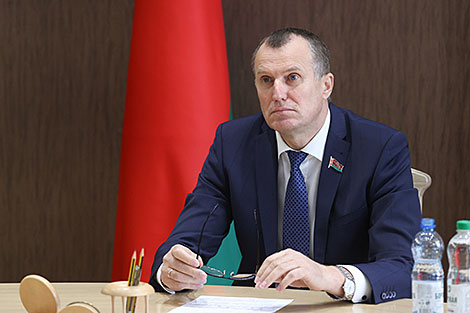Events
Call on Belarusian government and civil society to show unity

An archive photo
MINSK, 9 September (BelTA) – A targeted campaign of political and economic pressure, launched against Belarus, may affect the high results achieved by the country as part of the Sustainable Development Goals agenda, Deputy Chairman of the Council of the Republic, National Coordinator for the SDGs Anatoly Isachenko said at the meeting of the Council on Sustainable Development in Minsk, BelTA learned from sb.by.
According to the vice-speaker, the meeting is a good opportunity to take stock of the work of the national architecture for achieving the SDGs and to outline plans for the future.
“We also need to consider the issues of a targeted campaign of political and economic pressure launched against Belarus. Such negative trends can affect the high results achieved by the Republic of Belarus in various sectors and, in particular, in the SDGs processes. I emphasized the inadmissibility of such a situation in my address to the UN General Assembly. The sustainable development of Belarus depends on everyone - and we have to be united in this. For Belarus, the unity of government and civil society is more important than ever. I would like to emphasize that the president’s strong position, the policy implemented in Belarus today and the course chosen by our people a quarter of a century ago to build a strong state based primarily on human interests enable Belarus to rank high in the global Sustainable Development Goals list year after year,” said Anatoly Isachenko.
As UN Resident Coordinator in Belarus Joanna Kazana-Wisniowiecki said, the 2030 Agenda is still relevant, including as the need for a joint response to the challenges, which requires urgent joint actions of all partners. “On this basis, the UN is always ready to support Belarus in this direction,” she added.
First Deputy Chairperson of the National Statistical Committee Elena Kukharevich said at the meeting that the entire world community made an interim summary of the SDGs last year.
“The Belarusian Statistical Committee joined the work to make an analysis. We also summarized the interim results of Belarus' achievement of the Sustainable Development Goals. We found that our country has made the most progress on Goal 1 (elimination of poverty) and Goal 2 (elimination of hunger). We have a good level of achievement with regard to the goals “Good Health and Well-Being and “Quality Education”. Nevertheless, we have some issues with a number of the goals. For example, there is still a salary gap between women and men. The spread of the coronavirus infection across the globe has had a negative impact on transportation. There are also difficulties with reduction of energy intensity of GDP,” Elena Kukharevich said.
Belarus stays committed to the principles of green economy, one of the most important directions of achieving the SDGs. Deputy Minister of Natural Resources and Environmental Protection Aleksandr Goroshko said that in order to successfully implement the SDGs the country has been working on the implementation of legislation and has already defined priority areas of green economy development in Belarus till 2025.
“Among them are digital technologies, adaptation and mitigation of climate change, smart and energy-efficient green cities, and other areas. The introduction of green economy will have not only environmental but also economic effect,” he said.
Belarus has also joined the joint statement of the UN High-Level Meeting on Water which was signed by 156 countries, thus confirming a strong commitment to Sustainable Development Goal 6. The joint statement highlights the critical challenges to making progress on the 2030 Agenda for Sustainable Development, from lack of transparency in international processes, to water scarcity caused by growing demand and climate change, to insufficient funding. It also recognizes the need for innovative approaches to address these challenges - multilateral and multidisciplinary approaches to achieve integrated water resources management, more data and science-based information on the impacts of climate change, and strengthening transboundary water cooperation.
The meeting of the Council on Sustainable Development summed up some preliminary results of Belarus’ work to achieve the SDGs.
Anatoly Isachenko, told the media that the country has to do everything to ensure that the Sustainable Development Goals remain a priority. “We need to work to make even more progress in achieving these goals. The figures voiced today - that the Republic of Belarus has achieved 80% of the targets set in this regard - speaks volumes,” he said.
The second block of questions at the meeting was the impact of unilateral coercive measures against Belarus on the country's achievement of the SDGs.
“Although the Sustainable Development Goals are global in nature, each goal concerns a specific person, works to improve people’s life and well-being. That is why we say: ‘think globally, act locally’. The Sustainable Development Goals mean access to education, affordable healthcare, and a green economy. Almost all of the speakers today have noted that sanctions against our country have an impact on achieving the SDGs. Of course, this does not means that our country has stopped moving. Tactically, the sanctions may make us uncomfortable, but strategically, our country decided long ago on its development priorities, which were voiced at the 6th Belarusian People's Congress. We are all working in this direction and will continue to do so,” Anatoly Isachenko said.







 print version
print version make home page
make home page add to bookmarks
add to bookmarks

